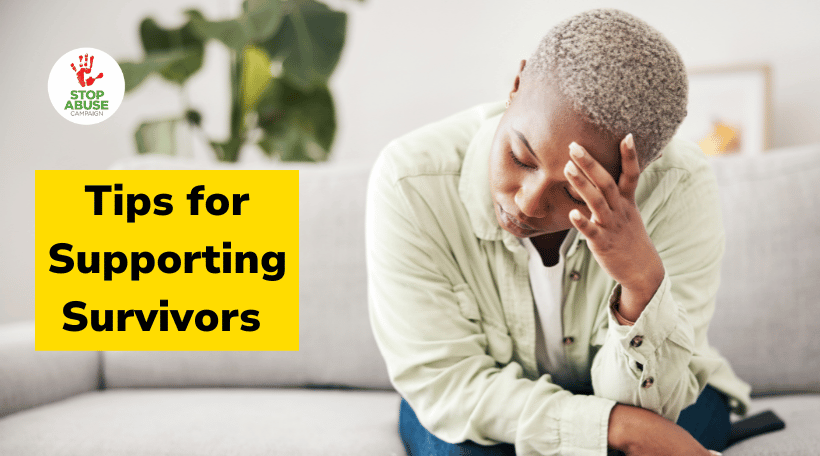5 tips for friends of survivors
By Maria Mochow
Your friend has just told you that they have been sexually assaulted, abused, stalked or raped and you want to support them but you’re not sure what they need. Maybe it happened to them decades ago, in childhood, or maybe it was as recent as today. You want to help your friend in any way you can. Situations may vary, but here are 5 tips for friends of survivors.
Tip #1. “I believe you.”
Your friend may have been dismissed or met with disbelief before, or they might be afraid that they will not be believed. Gaslighting is a form of emotional abuse by which the abuser denies a victim’s perception of reality. Survivors of gaslighting may question their own sanity or look for witnesses to support reality. They may be expecting others to dismiss them as the abuser has, especially if they have also been dismissed by other friends or family they may have reached out to for help. Confirming your faith in your friend, in their sanity, honesty, and accepting their testimony of what happened to them is the vital starting point. If you don’t believe them, you can’t help them. By stating that you believe them and that you are there for them, you are already taking the first step in being a source of comfort and healing to survivors.
Tip #2. Listen.
This one seems obvious but it is more difficult in practice than in theory. Hear your friend. Listen if they need to talk about it. You have to let them tell the story at their own pace. They may need to talk about even the most horrible parts–or there may be things that they can never talk about. Never pressure a survivor to talk or try to force a confidence. That isn’t listening to their needs. If you listen, you will have more of the details of the situation which will enable you to take the next step. It is especially important to allow your friend to feel their feelings and express all emotions freely.
Tip #3. Take Action.
What does your friend need you to do right now that you know? Your friend may need someone to go to the hospital with them. Or to the police station to support them in making a report. Or to the hearing or trial. Has your friend been tested for STIs? Do they need help looking for a counselor or assistance with childcare? Do they need you to pick up some food or their medication? Or do they just need you to be with them right now? If you’re not sure, you can also ask them questions like “how can I best support you right now?” to enable them to ask for the kind of support they want rather than making assumptions about what they might need. Whatever they need, take courage, spring to work, and don’t forget the next step.
Tip #4. Safety First.
You must keep yourself and your friend safe. Keep your phone charged and easily accessible. Know the numbers that you will need to call. Know the warning signs of PTSD, self-harm and suicidal ideation. If your friend’s attacker is still free, be wary. If they are still an active threat, take steps to protect yourself and your friend. Offer the survivor a safe place to stay and contact the authorities. Get help and don’t leave him or her alone. Perhaps take a self-defense class together. If your friend is being threatened or stalked, save, document and report all threatening texts, emails, messages, and photos to the police. Never underestimate a known attacker or dismiss a threat as idle. Never post your location on social media and block all mutual “friends” that you may have with the attacker. Remember, most acts of sexual violence are perpetrated by someone the survivor knew and trusted.
Tip #5. Have a little faith.
If your friend is religious, you might hear or see them pray or invoke a higher power. Even if you are non religious, be supportive of this. For people of faith, prayer can be a source of great comfort and healing. Perhaps you are religious but your friend is not, so ask if you may pray for them. Maybe you’re both religious but of different faiths, so you can seek out prayers that reflect what your faiths have in common or ones that your friend finds consolation in. Remember to meet your friend where they are currently at where their relationship to faith is concerned. Never push prayer or your vision of God on a survivor who is not religious, angry at God, or going through a crisis of faith.
These are just a few general guidelines for friends of survivors on how to be a help to a brave friend in need. Take heart and remember, you are not alone.
Do you know your score?
Discover your ACE score and unlock a new understanding of your life. Take the test and gain insights into how your early experiences shape your well-being. Don't let your past define you – empower yourself with knowledge.
